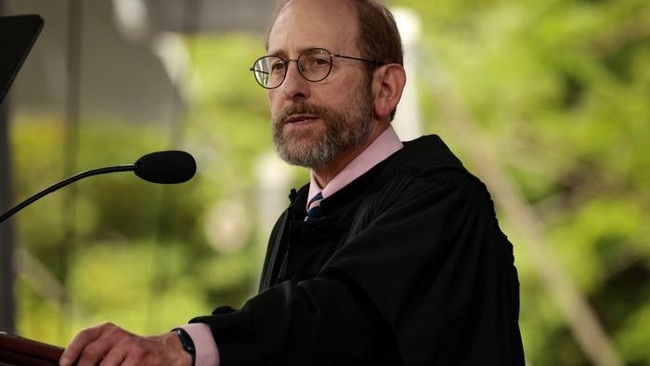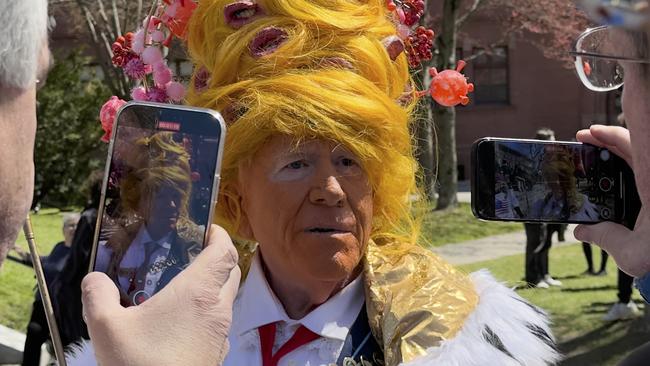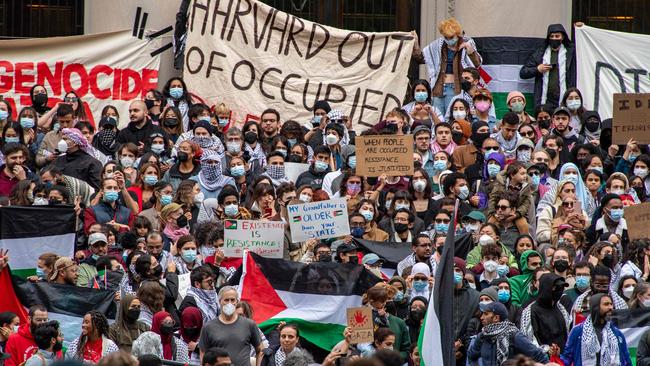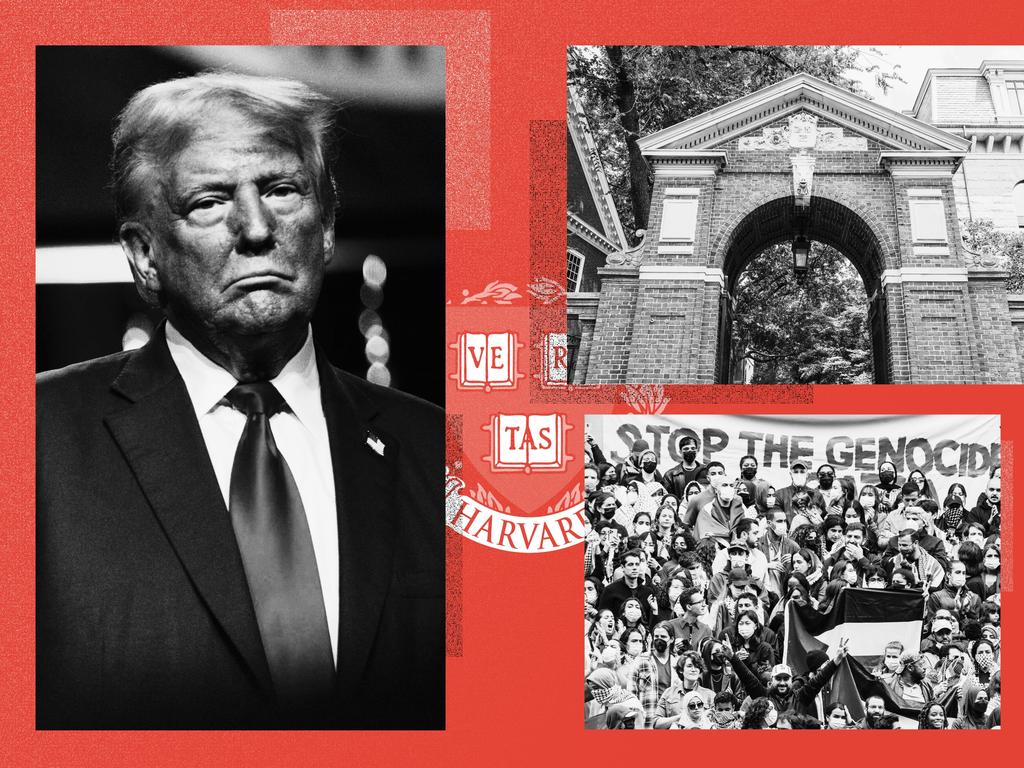The mild-mannered Harvard president who became the face of resistance to Trump
Alan Garber, a Jewish doctor and economist, has helped the university navigate concerns about antisemitism on campus

Alan Garber, then Harvard University’s interim president, stepped onto a stage in Harvard Yard last May to address thousands of alumni and faculty. As the applause faded, a woman approached the lectern and dumped gold glitter on Garber’s head, shouting about releasing monkeys from Harvard labs.
His face still half-covered in sparkles, Garber assured nearby attendees he was all right before telling the surprised crowd, “I hope that Harvard will always continue to be a place where … free speech continues to thrive.”
That composure during turmoil has become Garber’s hallmark. The doctor and economist took over last year after his predecessor Claudine Gay resigned amid plagiarism allegations and blowback to the university’s handling of pro-Palestinian protests.
A mild-mannered academic who entered Harvard as an undergraduate in the 1970s, Garber became a symbol of Trump resistance on Monday when he declared the university would reject government demands to audit Harvard’s admissions, hiring and the viewpoints of faculty, staff and students.
“The University will not surrender its independence or relinquish its constitutional rights,” Garber wrote in a message, after the Trump administration sent a five-page demand list as part of its wider crackdown over antisemitism concerns at elite colleges.
“No government — regardless of which party is in power — should dictate what private universities can teach, whom they can admit and hire, and which areas of study and inquiry they can pursue,” Garber stated.

Hours later, Trump’s antisemitism task force froze more than $2 billion in federal grants. The administration then threatened Harvard’s tax-exempt status and ability to enrol international students, and demanded records on money Harvard receives from foreign sources.
Garber’s stand won widespread praise across Harvard’s famously decentralised campus, though many fear for the future of America’s oldest and richest university. Already, scientists are making plans to cut staff, euthanize research animals and halt projects.
Unity seemed unlikely when Garber assumed temporary leadership in January 2024. Campus protests over the Israel-Hamas war, like at other schools, left many Jewish students and staff feeling unsafe as reports of antisemitic behaviour rose.
Garber has attempted to stabilise the campus using an understated approach he demonstrated during his previous 13 years as provost. A few months into the job, he endorsed a policy limiting when Harvard would weigh in on world events. Gay had faced scrutiny for her initial response to the Oct. 7, 2023 attacks in Israel, which some said should have condemned Hamas.
In August, Garber shed his interim title and committed to lead the university through the 2026-2027 academic year.
Garber, 69 years old, has had ties to Harvard throughout his adult life. He earned his undergraduate and master’s degrees in economics there. He then concurrently completed a Ph.D. in economics at Harvard and his medical degree at Stanford.

After a Boston residency where he met his wife, he returned to Stanford for 25 years, until then-Harvard president Drew Gilpin Faust recruited him to be provost in 2011. Those who have worked with him say his interdisciplinary background helps him create collaborations across typically siloed departments.
“He combines the analytic acuity of a first-rate economist with the compassion and bedside manner of a great physician,” said Lawrence Bacow, Harvard’s president before Gay.
Garber’s own Jewish faith makes the focus on campus antisemitism a particular pain point, those who know him say. In March, he told Harvard’s community he had experienced antisemitism directly, even while president, and called it “one of the most insidious forms of bigotry.”
He had made changes to try to avert the current crisis, including dismissing leaders at Harvard’s controversial centre for Middle Eastern studies, reinforcing intellectual-diversity guidelines and unwinding a West Bank university partnership.
Some faculty viewed the moves as kowtowing to Trump and overstating antisemitism on campus, said Ryan Enos, a Harvard government professor. Garber’s moral stance Monday heartened Enos and others, though some students and professors still refused to attend a Thursday rally where many were applauding Garber’s actions. “Some were so deeply upset with his leadership,” Enos said.
Others believe university leaders haven’t done enough to protect Jewish students.
Rabbi Hirschy Zarchi, who founded Harvard Chabad, said stricter protest-controls could have helped prevent the university’s current predicament.
“It’s unfortunate it’s come to this,” Zarchi said. He has sought help from Garber, whom he considers a personal friend, over the years, but said he wanted more discipline for faculty and students he views as intimidating Jewish students and disrupting learning.
While the university rallies behind Garber, Zarchi wonders whether such unity will persist if Garber takes further actions to combat antisemitism, including removing people from positions of power. “That will be a very revealing moment,” he said.
Growing up in Rock Island, Ill., Garber showed early scientific aptitude. In eighth grade, he earned statewide accolades for a science project showing the effects of drugs on brine shrimp. During a high school trip to Israel, he studied cellular immune reactions at a science institute between visiting holy sites.
His family of five owned a liquor store and were active in the Jewish community of the Quad Cities, a region spanning Illinois and Iowa.
He finished his senior year at Chicago’s Mather High School, where he was named among the top 10 students in his class, and studied at Yeshiva at night. He entered Harvard as a freshman in 1973.
Returning as provost in 2011, he forged several inter-school initiatives. During the pandemic, he chaired a Covid-19 advisory committee that helped guide the university’s response. A runner, he was frequently seen training for the Boston Marathon.
After his May glitter bombing, Garber stressed the importance of a university older than the country itself. “We make life better than it was yesterday,” he told generations of alumni, some wearing top hats, a nod to history. “Harvard is each of us. And each of us is Harvard.”
Wall Street Journal






To join the conversation, please log in. Don't have an account? Register
Join the conversation, you are commenting as Logout